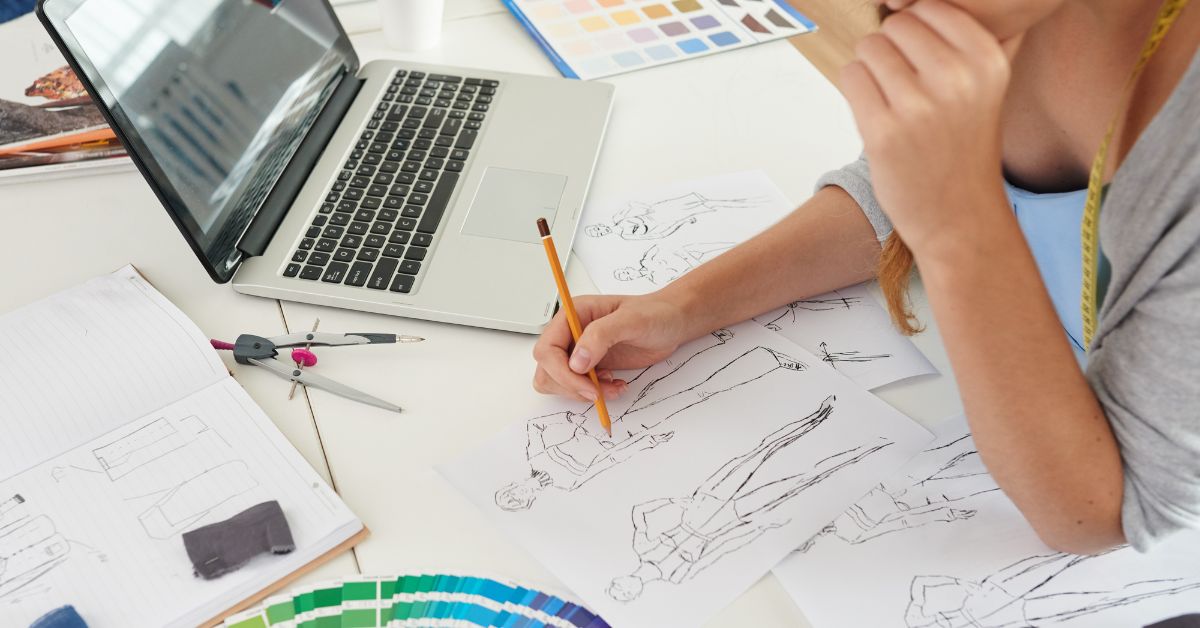Discovering the top career opportunities in fashion design unravels an impactful field with various ways for innovation. For those with a passion for the fashion industry, the industry offers various exciting opportunities about style and design.
In this article, we will learn about career options in fashion designing, fashion designing roles, and required skills and qualifications. So, if you are someone looking for opportunities in this competitive industry of fashion designing continue reading this article.
Table of Contents
- Key Career Paths in Fashion Designing
- Emerging Trends and Opportunities
- Required Skills and Qualifications
- Educational Paths and Training Programs
- Building a Strong Portfolio
- Networking and Industry Connections
- Internships and Work Experience
- Starting Your Own Fashion Line
- Career Growth and Advancement
- Conclusion
Key Career Paths in Fashion Designing
There are various lucrative fashion design careers in the field of fashion design. The fashion industry is for those who are passionate about fashion and willing to start a career in this field.
Here are a few career options in fashion designing:
- Fashion Designer
- Textile Designer
- Fashion Illustrator
- Fashion Stylist
- Fashion Merchandiser
- Fashion Buyer
- Fashion Photographer
- Costume Designer
- Fashion Marketing and PR
- Fashion Blogger/Influencer
- Fashion Designer: With a focus on designing creative and customized designs, fashion designers create various styles for their customers or clients. Motivated by top sellers, fashion shows, and trends, most enthusiasts work with street fashion, making cheap and affordable apparel, and wholesale market clothing. They decide on the colours, fabrics, and design of the item on the basis of stock planning and merchandising crew suggestions.
- Textile Designer: Apparel designers or textile designers make fabric designs using hand sketched or CAD software, which are then repeated to cover fabric yards. To align designs with apparel styles, seasons, and client preferences, they work as freelancers or for a company, partnering with fashion experts and sellers. With the help of conducting trend research and forecasting, they make sure they are current with the trends.
- Fashion Illustrator: Designers need hand illustrations or sketches for their designs to show their ideas. Therefore, they need solid sketching and communication skills to present their ideas with clarity and to put their thoughts to action. They are one of the most important and sought-after professionals at a major fashion store or company.
- Fashion Stylist: The role of a stylist is to make outfits for clients, give clothing advice, and work with brands. The work of a brand stylist is to create looks for photo shoots for showcasing apparel and accessories, while personal stylists assist customers in selecting attractive, cost-effective fashions. They understand the client’s needs and recommend new trends and updates to improve their current wardrobe.
- Fashion Merchandiser: Overseeing that the right product is available in the retail stores at the correct time, in the correct quantities, and with the correct price is the primary job of a fashion merchandiser. They work in stores or at a corporate level, partnering with designers and product developers to manage the lifecycle of the product and make products that will bring in profits. If the margins are at risk, they can also change the styles or prices of the product.
- Fashion Buyer: The purchasing and selecting of clothing and accessories for a retail store or a brand is the primary role of a fashion buyer. They attend fashion shows, consult fashion suppliers, and research trends which helps them be current on the trend and appeal to their clients. Their main focus is on stocking stores with current and fashionable clothing and accessories that will sell fast and fit within the company’s budget.
- Fashion Photographer: Many students take up photography which aligns with their fashion studies and industry. To be a fashion photographer it is important to have an eye for detail. This research gains knowledge of current fashion trends and how styles look in a picture making it perfect for them to capture their client’s picture as per the research.
- Costume Designer: The creation of clothing or costumes for characters in TV shows, cinema, and theatre productions is done by costume designers. They research and understand the story behind the costume and create a costume that shows the time period and personality of the characters. With the help of directors and actors, they make sure that the costumes enhance the overall production. This is a perfect role for someone who loves fashion and storytelling.
- Fashion Marketing and PR: Promoting fashion brands and events for the public is the role of a fashion marketing and PR team. They build brand awareness through social media and advertising. They also conduct public relations and collaborations with journalists and influencers to generate good media coverage. They attract customers in the industry by creating a strong brand image.
- Fashion Blogger/Influencer: With the help of blogs or social media, fashion bloggers or influencers post fashion tops, fashion updates, and personal style online. To engage with their audience they make videos, photos, and articles. To promote products and influence their followers’ choices of fashion, they partner with brands. This is an ideal role for those who are enthusiastic about sharing their fashion insights with others.
Emerging Trends and Opportunities
Here are a few emerging trends and opportunities:
- There is a growing demand for eco-friendly and ethical clothing.
- The use of 3D printing and smart textiles in fashion is increasing as there is an increase in technology.
- Growth of e-commerce and social media shopping.
- Increase emphasis on various styles, sizes, and genders, and cultures
- Fashion goods are becoming increasingly individualized and made-to-order.
- New firms developing fashion applications and wearable technology.
Required Skills and Qualifications
There are various skills that a fashion designer needs to have to be a successful designer. Here are a few skills and qualifications that a fashion designer needs to have:
- Creativity and Innovation: Create distinctive and fashionable clothing, bringing new perspectives and creative ideas to the industry.
- Technical Skills: To create the best quality of clothing, specialize in designing software, stitching, and fabric making.
- Business Acumen: Understanding market trends, sales techniques, and brand management is essential for navigating the fashion business with success.
- Networking and Communication: Promote your design with good communication skills and make solid industry connections.
Educational Paths and Training Programs
The AAFT Online Diploma in Fashion Design provides a flexible and comprehensive curriculum that includes fashion illustration, garment fabrication, textile design, and fashion marketing. Virtual workshops and projects provide students with hands-on experience from industry pros. The online format allows for self-paced study, which is perfect for people who have other responsibilities. This program provides graduates with the necessary skills and knowledge for a variety of professions in the fashion business, equipping them for a successful career as fashion designers.
Building a Strong Portfolio
To gain opportunities in the fashion industry, a good portfolio is important for showcasing your skills. Here’s how to build an impressive:
- Diverse Work: Add various designs, from hand illustrations to finished outfits, to showcase your ability.
- Superior Images: Use professional images to showcase the minute details and production or craftsmanship of your work.
- Individual Style: To make yourself stand out from others, show your unique designs and style.
- Incorporate Projects: Add in projects that are similar or in alignment with the role or brand you are pursuing.
- Appearance: Organize your portfolio properly, with simple tags and descriptions for every item.
Networking and Industry Connections
Industry networks are important to be successful in the fashion industry. Be a part of fashion shows, seminars, and industry events to interact with experts and build a connection. Stray with the trends by being a part of online communities and fashion groups. Connecting with peers, coaches, and influencers can lead to internships, job opportunities, and partnerships. You can gain insights, assistance, and acceptance through strong industry connections, important for an impactful fashion design career.
Internships and Work Experience
To build a lucrative career in the fashion industry, having an internship and work experience is very crucial. It offers important insights, networking opportunities, and hand-on learning experience. It also helps you apply your curriculum knowledge to actual-life situations, improving your skills. The experience of an internship or full-time job helps you get closer to your desirable position in this competitive industry of fashion, as it strengthens your resume.
Starting Your Own Fashion Line
To begin with your own fashion line it needs innovation, business understanding, and industry insights. The Diploma in Fashion Design by AAFT Online teaches essential skills in design, promotions, and production. Create a distinct brand identity, write a business strategy, and establish a strong web presence. Use your education to locate fashion trends, oversee production, and promote your design successfully, laying the foundation for a prosperous fashion brand.
Career Growth and Advancement
There has to be recurring learning and skill development to see career growth in the fashion industry. Take advanced programs, attend seminars, and keep up with the trends in the industry. Building good connections and gaining various skills can result in positions with responsibilities, like a senior designer or creative director. Showcasing your own style and achievements allows you to stand out, paving the way for advancements and expanded prospects in the fashion business.
Conclusion
The fashion industry offers a wide range of exciting careers in fashion for those with a passion for style and design. From fashion designers and textile designers to fashion bloggers and influencers, each role plays a crucial part in shaping the industry. Whether you’re interested in starting your own fashion line or advancing to senior roles, the right skills, education, and networking are essential. By exploring jobs in fashion design and leveraging industry connections, you can build a successful and fulfilling career in the dynamic world of fashion.
(Visited 4,983 times, 1 visits today)
Popular Search
Top 10 DJ India
Makeup Steps
Advantages of Makeup
Interior Designer Salary
Makeup Artist Course
Benefits Of Photography
Hospital Waste Management
Types of Fashion Designing
Types of Lenses in Photography
How to Become a Radio Jockey
Best Nutrition Courses in India
Importance of Media Management
How To Become a Dietitian in India
Importance of Nutrition in Health
Interior Design History and Origins
Top 10 Famous Interior Designers
Top 10 Music Labels in India
Top 10 Best Animation Studios in India
Top 10 Nutraceutical Companies in India
Top 10 Fashion Designers in the World
How To Write a TV Commercial Script
Top 10 Career Opportunities in Fashion Designing
Advantages and Disadvantages of Animation
























